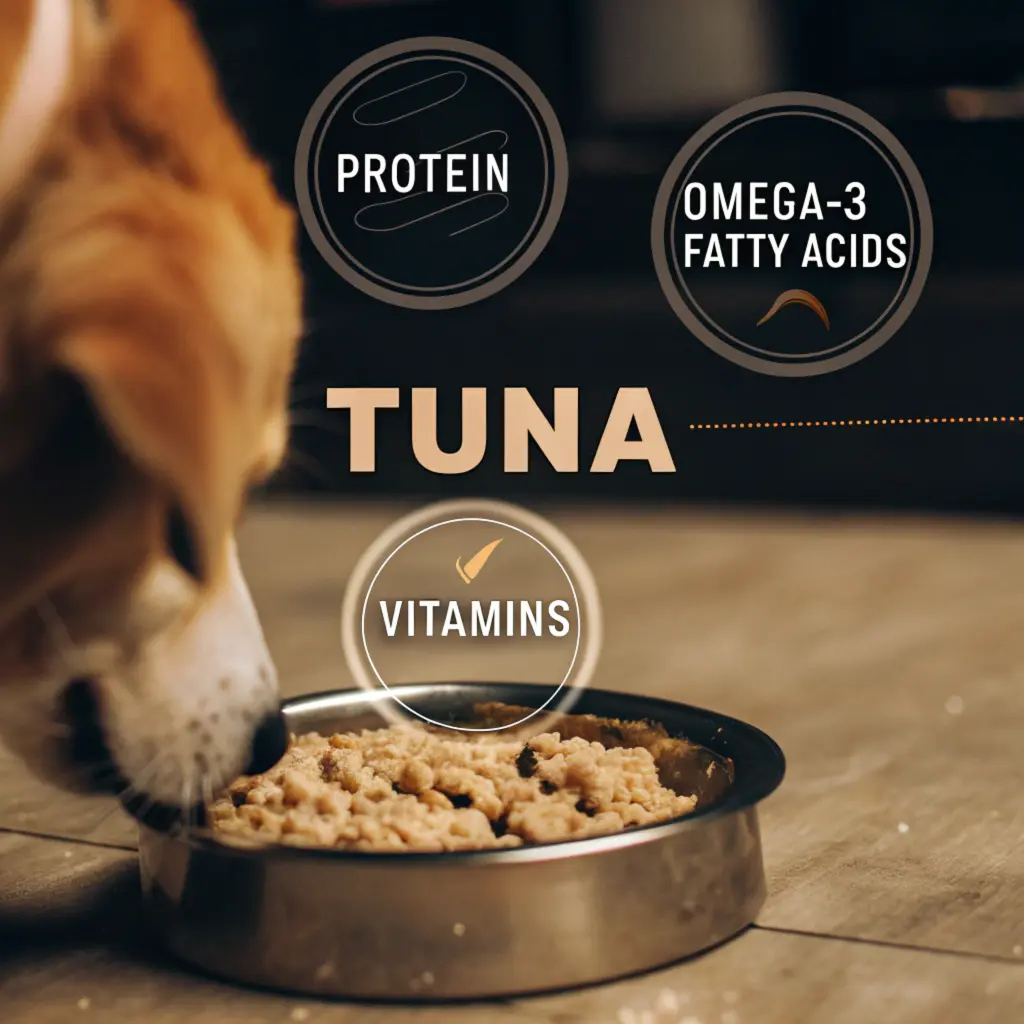Can Dogs Eat Tuna? Everything You Need to Know Today Here
Dogs are curious eaters, often intrigued by human food like fish. This leads many owners to wonder, can dogs eat tuna, and if so, is it a safe option? For those considering convenience, the question extends to can dogs eat canned tuna. The answers might surprise you! Dive in to uncover the nutritional perks, hidden risks, and expert tips that will keep your furry friend thriving.
Table of Contents
Table of Contents
Can Dogs Eat Tuna ? Understanding the Basics
Many pet owners wonder if their dogs can eat tuna. This section explains the importance of understanding your dog’s dietary needs and knowing what is safe for them, like tuna, to ensure their health and provide a balanced diet.
Pet owners frequently wonder whether dogs can eat tuna.
Many pet owners ponder can dogs eat tuna, intrigued by its high protein and omega-3 content. The question often evolves to can dogs eat canned tuna, given its convenience. Safety concerns, such as mercury exposure and proper preparation, drive this curiosity. Understanding these factors ensures a balanced and healthful diet for their furry companions.
Importance of Understanding a Dog’s Dietary Needs
A dog’s dietary needs are pivotal to their health and vitality. Understanding what is safe and beneficial, such as pondering can dogs eat tuna, helps owners make informed choices. Nutritional balance ensures proper growth, energy, and immunity. Feeding the wrong foods can lead to deficiencies or harm. Awareness safeguards your dog’s long-term well-being while fostering a happy, healthy life.
Is Tuna Safe for Dogs
Tuna can be safe for dogs when given in moderation, offering nutritional benefits like protein and omega-3 fatty acids. However, it’s important to understand the risks, such as mercury levels and added salt in canned tuna. This section explores the pros and cons of feeding tuna to dogs, helping pet owners make informed decisions for their furry friends.

The Nutritional Benefits of Tuna for Dogs
Can dogs eat tuna? Absolutely, when served in moderation. Tuna is rich in high-quality protein, essential omega-3 fatty acids, and vital vitamins like B12. These nutrients support a dog’s coat health, boost immunity, and promote cognitive function. The healthy fats in tuna can also aid in joint health and reduce inflammation. However, it’s important to offer it in the right quantities to avoid potential risks like mercury exposure. Here’s a table outlining the benefits of tuna for dogs, along with the key properties of each benefit:
| Benefit | Properties |
| High-Quality Protein | Tuna is an excellent source of protein that aids in muscle growth, tissue repair, and overall body function. |
| Omega-3 Fatty Acids | Rich in omega-3s, particularly EPA and DHA, which promote heart health, reduce inflammation, and improve coat condition. |
| Vitamins (B12) | Tuna provides essential vitamins like B12, which boost energy metabolism and contribute to a strong immune system. |
| Cognitive Function | The omega-3s in tuna support brain health, enhancing cognitive function and memory, especially in aging dogs. |
| Joint Health | Omega-3 fatty acids help reduce joint inflammation, alleviating pain and stiffness, particularly beneficial for older dogs. |
| Skin and Coat Health | Tuna’s healthy fats support a shiny coat and relieve dry skin or irritation. |
.
Potential Risks of Feeding Tuna to Dogs
While can dogs eat tuna is a common question, there are potential risks to consider. Tuna, especially larger species, can contain high levels of mercury, which may lead to toxicity if consumed frequently. Additionally, canned tuna often contains added salt or oil, which can be harmful to dogs in excess. To avoid these risks, it’s crucial to serve tuna in moderation and opt for safe, mercury-low varieties like light tuna.
Understanding Mercury Levels in Tuna and Its Impact on Dogs
When asking can dogs eat tuna, it’s important to consider mercury levels, especially in larger fish species like albacore. High mercury content can lead to toxicity in dogs, causing neurological damage and other health issues. For those wondering if can dogs eat canned tuna, the risk is higher due to the potential for elevated mercury levels in canned varieties. It’s essential to choose tuna with lower mercury content and limit servings to safeguard your dog’s health.
Types of Tuna: Which Ones Are Safer for Dogs
When asking can dogs eat tuna, it’s crucial to choose the right variety. Light tuna, commonly found in cans, typically contains lower mercury levels compared to albacore tuna. Albacore is higher in mercury, which can pose health risks. For a safer option, stick with light tuna and serve in moderation to protect your dog’s health.
This table helps you make the right choice easil
| Type of Tuna | Mercury Content | Best Option for Dogs | What You Should Know |
| Light Tuna | Low Mercury (around 0.12 ppm) | Best Option | Light tuna is the safest choice for dogs due to its low mercury levels. It’s typically found in canned varieties and should be served in moderation. |
| Albacore Tuna (White Tuna) | High Mercury (up to 0.35 ppm) | Less Recommended | Albacore contains much higher mercury levels and should be avoided or given only in limited amounts to minimize risk. |
| Skipjack Tuna | Low Mercury (around 0.13 ppm) | Safe Option | Skipjack tuna, another low-mercury variety, is also a good option, though still be cautious with portion sizes. |
Key Takeaways:
Can dogs eat tuna? Yes, but the type of tuna matters.
Light tuna is the safest choice due to its low mercury content.
Avoid albacore tuna as it has higher mercury levels, which can be harmful to your dog’s health.
Always remember to serve tuna in moderation and avoid excessive portions to prevent mercury toxicity and ensure your dog’s well-being.
How to Safely Feed Tuna to Dogs
Feeding tuna to dogs can be safe if done properly. This section covers important guidelines, including proper portion sizes, preparation methods (raw vs. cooked), and alternatives for dogs with sensitive stomachs. By following these tips, pet owners can ensure their dogs enjoy the benefits of tuna without any health risks.
Proper Portion Sizes to Avoid Overfeeding
When considering whether can dogs eat tuna, portion control is key. Serving too much tuna can lead to overfeeding and health risks, especially due to mercury levels. A safe guideline is to offer small amounts, about one teaspoon per 10 pounds of body weight. This ensures that dogs benefit from the nutrients without the dangers of excessive intake, promoting their overall well-being.Here’s a general guideline outlining the recommended amount of tuna to feed your dog per week:
Small Dogs (Under 20 lbs)
Max per week: 1-2 teaspoons
Serving size: ½ teaspoon per meal, 2-3 times a week
Medium Dogs (20-50 lbs)
Max per week: 1-2 tablespoons
Serving size: 1 tablespoon per meal, 1-2 times a week
Large Dogs (50-90 lbs)
Max per week: 2-3 tablespoons
Serving size: 2 tablespoons per meal, recommended 1 to 2 times a week.
Extra Large Dogs (Over 90 lbs)
Max per week: 3 tablespoons
Serving size: 1-2 tablespoons per meal, 2 times a week
Important Notes:
Moderation is key: Tuna should be served as a treat, not a regular part of your dog’s diet.
Limit canned tuna: Due to added salt and potential mercury levels, it’s important to limit the amount of canned tuna offered.
Always opt for light tuna: Light tuna typically has lower mercury content than albacore (white) tuna.
Adjust based on your dog’s size, health, and dietary needs, and always consult with a vet if you’re uncertain.
Preparing Tuna for Dogs: Raw vs Cooked
When considering Can dogs eat tuna, preparation is crucial. **Can dogs eat canned tuna**? Yes, but it is best to choose tuna packed in water, without added salt or oil. Raw tuna can pose a risk due to parasites and bacteria, so it is safer to cook it lightly. Avoid adding spices or oil, as this can cause digestive upset. Always make sure to cook tuna fully and serve it in moderation for your dog’s health.
Alternatives to Tuna for Dogs with Sensitive Stomachs
If you’re wondering can dogs eat tuna but your dog has a sensitive stomach, consider alternatives like cooked chicken, turkey, or salmon. These protein sources are gentler on the digestive system. Another option is pumpkin, which can soothe the stomach. Always introduce Introduce new foods gradually to prevent digestive issues. Consulting a veterinarian ensures that you make the best choice for your dog. dietary needs.
Here’s a table listing 5 healthy fish alternatives to tuna for dogs, which can be gentler on their digestive system:
| Fish Type | Benefits for Dogs | Key Nutrients | Best Served As |
| Salmon | Rich in omega-3 fatty acids, supports coat health | Omega-3, protein, vitamins B12, D | Cooked, without bones |
| Sardines | High in healthy fats and calcium | Omega-3, calcium, protein | Cooked or canned in water |
| Herring | Good for joint and heart health | Omega-3, vitamin D, protein | Cooked, fresh or frozen |
| Mackerel | Supports cognitive function and heart health | Omega-3, protein, vitamin B12 | Cooked, without bones |
| Cod | Low in fat, good for sensitive stomachs | Protein, vitamin B12, selenium | Cooked, filleted |
These fish types offer similar nutritional benefits to tuna but can be easier on sensitive stomachs when properly prepared. Always consult your veterinarian to determine the best fish options for your dog.
Signs of Tuna-Related Health Issues in Dogs
Feeding tuna to dogs can sometimes lead to health issues, such as mercury poisoning or allergic reactions. This section highlights common symptoms to watch for, including signs of mercury toxicity and allergies, as well as why it’s best to avoid tuna for puppies. Stay informed to keep your dog safe and healthy.

Common Symptoms of Mercury Poisoning in Dogs
When wondering can dogs eat tuna, it’s important to watch for signs of mercury poisoning. Symptoms may include vomiting, diarrhea, uncoordinated movements, tremors, or excessive drooling. In severe cases, neurological damage may occur, resulting in confusion or seizures. If any of these symptoms appear after consuming tuna, seek immediate veterinary attention. prevent further harm.
How to Spot Allergic Reactions to Tuna
When asking can dogs eat tuna, it’s crucial to monitor for signs of an allergic reaction. Symptoms may include itching, swelling, hives, or digestive upset like vomiting and diarrhea. In more serious cases, dogs may have trouble. breathing. If any of these symptoms appear after consuming tuna, discontinue feeding it and consult your veterinarian immediately for proper guidance.
Can you feed tuna puppies?
When considering if can dogs eat tuna, puppies require special attention. While tuna can offer nutritional benefits, it’s best to avoid feeding it to young puppies due to their sensitive digestive systems. Always consult your vet before introducing new foods to ensure their health and safety.
Expert Tips and Recommendations
Discover vet-approved ways to safely include tuna in your dog’s diet. This section provides practical tips on creating balanced recipes, ensuring tuna is prepared safely, and combining it with other nutritious foods to support your dog’s overall health.
Vet-Approved Recipes Incorporating Tuna for Dogs
If you’re wondering whether can dogs eat tuna, consider incorporating it into vet-approved recipes. Mix tuna with ingredients like sweet potatoes or carrots for a nutritious, tasty treat. Always ensure the tuna is prepared properly—cooked, without seasoning or bones—and consult with your vet to guarantee the recipe suits your dog’s dietary needs and health.
| Recipe | Main Ingredients | Additional Ingredients | Preparation Instructions |
| Tuna & Sweet Potato Mash | Cooked tuna | Mashed sweet potatoes | Cook tuna thoroughly, mash sweet potatoes, and combine. Serve in moderation. |
| Tuna & Carrot Patties | Cooked tuna | Grated carrots, egg | Combine the tuna, grated carrots, and eggs, shape the mixture into patties, and bake until fully cooked. |
| Tuna & Pumpkin Blend | Cooked tuna | Pumpkin puree | Mix cooked tuna with plain pumpkin.. . |
| Tuna & Rice Stew | Cooked tuna | Brown rice, peas | Cook rice and peas, then mix with cooked tuna. Serve in small portions for a filling meal. |
| Tuna & Spinach Salad | Cooked tuna | Spinach, olive oil | Combine cooked tuna with fresh spinach and drizzle with olive oil.. Serve as a nutritious meal. |
Always ensure the ingredients are safe for dogs and avoid using seasonings or harmful additives.
Balancing Tuna with a Complete and Nutritious Die
When wondering can dogs eat tuna, it’s essential to balance it with a complete and nutritious diet. Tuna offers valuable nutrients, but it shouldn’t replace a dog’s regular food. Combining tuna with healthy vegetables, grains, and other protein sources ensures your dog receives All the essential vitamins and minerals are necessary for optimal health. Always consult your vet for correct guidance.
FAQ
Can a dog eat canned tuna?
Can dogs eat canned tuna? Yes, dogs can consume canned tuna occasionally, but it’s crucial to ensure it’s free from additives like salt or oil. Moderation is essential to prevent potential health risks..
How much tuna can I safely give my dog in a day?
When wondering can dogs eat tuna, it’s essential to serve it in moderation. Typically, small amounts (a few teaspoons to a tablespoon) per day are safe, ensuring balance with their regular diet.
What fish can dogs not eat?
While can dogs eat tuna, other fish like shark, swordfish, and king mackerel should be avoided due to their high mercury levels. These can be harmful to a dog’s health over time
Can I feed my dog tuna and rice?
Yes, can dogs eat tuna with rice? It’s generally safe in moderation. Ensure the tuna is properly prepared, with no seasonings or bones.
How to tell if canned tuna is bad?
To determine if canned tuna has gone bad, check for bulging, rust, or an unpleasant odor.. Always ensure it’s fresh before wondering can dogs eat tuna
Can dogs eat tuna skin?
While can dogs eat tuna skin, it’s generally safe in small amounts. However, remove scales and bones for safety and digestibility. Always consult your vet before feeding
What happens if my dog eats raw tuna?
If you’re wondering can dogs eat tuna raw, it poses risks such as parasites and bacteria. Raw tuna may also cause digestive issues. Always cook tuna thoroughly to ensure safety for your dog.
Is tuna easy to digest for dogs?
Can dogs eat tuna? Tuna is generally easy to digest for dogs in moderation, provided it’s cooked and free of seasoning. Overfeeding can cause digestive upset, so portion control is essential.
Can dogs eat tuna in water?
Can dogs eat tuna in water? Yes, dogs can eat tuna in water, but it’s important to avoid added salt. Opt for tuna packed in water without any harmful additives to ensure safety
Can dogs eat tuna in oil?
Can dogs eat tuna in oil? It’s best to avoid oil-packed tuna, as it contains excess fat, which may upset your dog’s stomach. Similarly, raw meat can be dangerous due to bacteria and parasites.
Conclusion
Key Takeaways on Feeding Tuna to Dogs
In summary, can dogs eat tuna? Yes, but in moderation. While tuna provides high-quality protein and omega-3 fatty acids, it’s crucial to avoid overfeeding due to mercury content. Always opt for light tuna over white tuna and ensure it’s properly prepared, without bones or seasoning. Balancing tuna with other nutritious foods and consulting your vet will help maintain your dog’s overall health and safety.
Final Advice for Ensuring Your Dog’s Health and Happiness
To ensure your dog’s health and happiness, always prioritize balanced nutrition and appropriate portion sizes. When considering new foods, like tuna, consult your veterinarian to determine what’s safe and beneficial. Regular check-ups, a well-rounded diet, and mindful feeding practices will support a long, healthy life for your furry companion.

